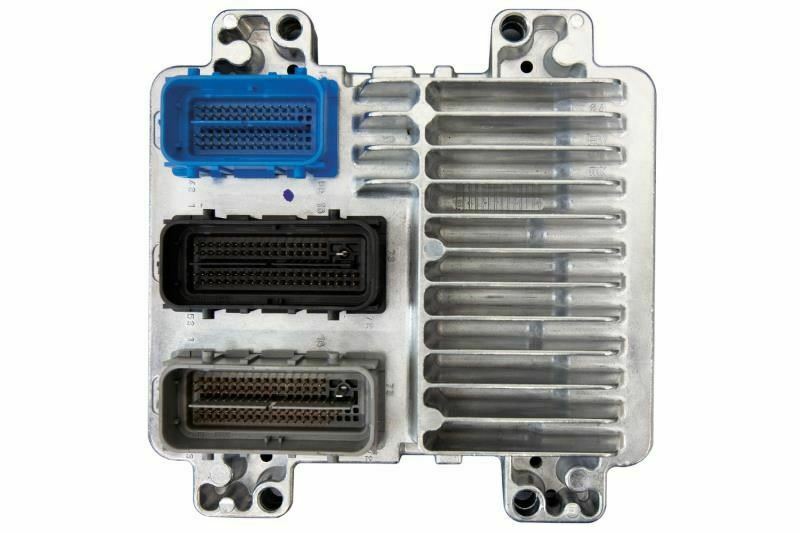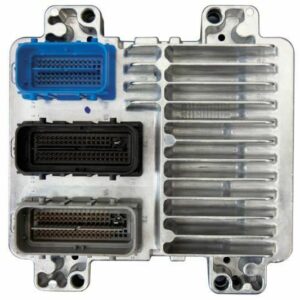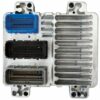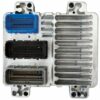Restore Your Vehicle’s Brain, Restore Your Peace of Mind
Is your Cadillac STS, Corvette, or Hummer H3 suddenly stalling, running rough, or refusing to start? Are you staring at a persistent Check Engine Light that no amount of guesswork can solve? Before you resign yourself to a costly and time-consuming dealership visit, consider the heart of your vehicle’s electronics: the Engine Control Module (ECM). As a technician with over two decades of experience under the hood, I’ve seen firsthand how a failing ECM can create a cascade of frustrating, hard-to-diagnose problems. This isn’t just a part; it’s the central command center for your engine’s performance, fuel efficiency, and emissions.
This isn’t just any replacement part. We offer a reliable, ready-to-install solution. Each 2009-2010 STS Engine Control Module is professionally programmed with the latest official GM software updates, specifically matched to your vehicle’s unique Vehicle Identification Number (VIN). This critical step, which we handle before shipping, eliminates the need for expensive scan tools or programming services. It’s designed to be a direct-fit, effective solution that gets you back on the road with confidence.
Case Study: A Tricky Diagnosis
I remember a 2010 Cadillac STS that came into the bay with a complaint of intermittent stalling at stoplights and a random P0606 (ECM/PCM Processor Fault) code. The owner had already replaced the spark plugs and a coil pack at another shop with no success. The symptoms were inconsistent, making it a diagnostic headache. After running a full diagnostic, we traced the issue to an internal failure in the original ECM. The processor was faulting under specific load conditions, causing the engine to cut out. By installing a VIN-programmed 2009-2010 STS Engine Control Module, we not only resolved the stalling but also improved the vehicle’s throttle response, thanks to the updated GM software. It’s a perfect example of how the right part, correctly prepared, is the only true fix.
Common Signs of a Failing ECM
A faulty engine computer can manifest in numerous ways. If you’re experiencing any of the following, a failing ECM is a likely culprit. Look out for these red flags and associated Diagnostic Trouble Codes (DTCs):
- ✔ Check Engine Light is on or flashes intermittently.
- ✔ Engine cranks but refuses to start.
- ✔ Noticeable drop in fuel economy.
- ✔ The engine stalls, stumbles, or misfires unpredictably.
- ✔ Poor acceleration or loss of power.
- ✔ Automatic transmission shifts erratically or harshly.
- ✔ Communication error codes, such as U0100 (Lost Communication with ECM/PCM).
- ✔ Internal module failure codes like P0601 or P0606.
A Straightforward Guide to Installation
Replacing your ECM is a manageable job for a confident DIYer. Our pre-programming service saves you the most complex step. Follow this general guide for a smooth installation.
- Safety First: Always disconnect the negative terminal from your vehicle’s battery and wait at least 15 minutes for the system capacitors to discharge.
- Locate the ECM: On the 2009-2010 STS, the ECM is typically found on the driver’s side (LH) frame rail. For other models, it may be on the firewall or in the engine compartment (refer to the fitment list for location hints).
- Disconnect the Connectors: Carefully release the locking tabs on the electrical wiring harnesses and pull them straight out from the module. Never force them. Inspect the connectors for any corrosion or damage.
- Remove the Old Module: Unbolt the old ECM from its mounting bracket. Keep the hardware, as you may need to reuse it.
- Install the New Module: Mount your new, pre-programmed ECM securely onto the bracket.
- Reconnect Everything: Firmly plug the wiring harnesses back into the new module until they click into place. Reconnect the negative battery terminal.
- Perform Relearn Procedure: You may need to perform a security or crankshaft position sensor relearn. A common GM procedure is to turn the key to the ‘ON’ position for 10-15 minutes, then ‘OFF’ for 10 seconds, and repeat two more times before starting the engine.
Verified Vehicle Compatibility
This module, part number 12678512, is a direct replacement for a wide range of GM vehicles and interchanges with several service numbers including 12636659, 12639300, and 12625453. Please confirm your vehicle is on this list:
- Cadillac STS (2009) – 4.4L & 4.6L (LH frame rail)
- Cadillac STS (2010) – 4.6L (LH frame rail)
- Cadillac CTS (2009) – 6.2L (RH front engine compartment)
- Cadillac DTS (2009-2011)
- Cadillac SRX (2009) – 4.6L (LH engine compartment)
- Cadillac XLR (2009) – ID 12636659 or 12625453 (RH front engine compartment)
- Buick Lucerne (2009-2011) – 4.6L (lower part of air cleaner box)
- Chevrolet Colorado (2009-2012) – 2.9L & 3.7L (RH firewall)
- Chevrolet Corvette (2009) – ZR1 (RH engine compartment)
- Chevrolet Trailblazer (2009) – 6.0L (LH engine)
- GMC Canyon (2009-2012) – 2.9L & 3.7L (RH firewall)
- GMC Envoy (2009) – 5.3L (LH engine)
- Hummer H3 (2009-2010) – 3.7L (RH firewall)
- Saab 9-7x (2009) – (LH engine)
Frequently Asked Questions
How do I provide my VIN for programming?
Simply enter your 17-digit VIN in the designated box on the checkout page. We cannot process your order without it, as we use it to load the correct, updated software for your specific vehicle.
Is any additional programming required after installation?
No, this module arrives fully programmed and ready for installation. In some cases, a simple ‘security relearn’ or ‘crankshaft variation relearn’ procedure may be necessary, which can typically be done without special tools. Instructions are widely available online or in service manuals.
Will this fix my specific problem?
This ECM is a direct solution for issues caused by a faulty module, including common DTCs like P0601, P0606, and U0100. While it resolves the vast majority of electronic engine problems, ensure a proper diagnosis has been performed to rule out other issues like bad sensors or wiring.
What does this part interchange with?
This ECM, part 12678512, is a direct replacement for many other service numbers, including 12636659, 12639300, 1263605, 12628993, 12628911, 12625453, 12622175, and 12630464.
Do I need to send my old part back?
No core charge is required for this part. You can keep or responsibly dispose of your old module.



